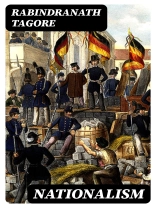In ‘Nationalism, ‘ Rabindranath Tagore presents a profound and critical exploration of the implications of nationalist ideology through a series of poignant essays. Tagore’s literary style is marked by a lyrical eloquence that blends philosophical reflection with socio-political critique, allowing him to confront the rise of nationalism in early 20th-century India with both beauty and urgency. Written against the backdrop of colonial subjugation, Tagore artfully examines the tensions between cultural identity and global interconnectedness, emphasizing the dangers posed by blind nationalism that forsakes humanism and ethical considerations in favor of exclusionary zealousness. Rabindranath Tagore, the first non-European Nobel laureate in Literature, was deeply influenced by the socio-political currents of his time, including the Indian independence movement and the burgeoning global challenges of nationalism. His multifaceted career as a poet, playwright, artist, and philosopher provided him with a unique perspective, leading him to advocate for unity over division and the importance of global citizenship. Tagore’s engagement with Western thought, particularly concerning culture and nationalism, reflects his commitment to fostering dialogue between diverse civilizations and promoting a universal brotherhood. ‘Nationalism’ is a resonant text for contemporary readers grappling with the complexities of identity and belonging in a polarized world. Tagore’s insights into the often-destructive nature of excessive nationalism serve as a cautionary tale, urging readers to cultivate a more expansive vision of community and humanity. By engaging with this work, readers will find themselves not only challenged but enriched, as Tagore’s wisdom resonates powerfully in today’s geo-political landscape.
Giới thiệu về tác giả
Rabindranath Tagore (1861-1941) was a colossus of Indian literature and a sage-like figure whose intellectual and artistic contributions have left an indelible mark on global culture. Born in Calcutta, during the British Raj, Tagore stemmed from a prominent Bengali family renowned for its artistic and intellectual pursuits. His multifaceted career spanned poetry, fiction, drama, music, philosophy, and education, with Tagore earmarked as a polymath and a Renaissance man of his era. A prolific writer, Tagore penned the profoundly influential work ‘Nationalism’ (1917), a critical reflection on nationalism in the West, Japan, and India, which continues to resonate in contemporary discourses on global politics and cultural identity. Tagore’s literary style blended classical Indian traditions with Western ideas, and he is best known for his lyrical poetry and his role in reshaping Bengali literature and music. In 1913, Tagore was awarded the Nobel Prize in Literature, becoming the first non-European to receive this accolade, largely for his acclaimed collection ‘Gitanjali.’ His literary prowess, imbued with spiritual and humanistic insights, has translated into a timeless legacy that transcends geographical and cultural boundaries. Revered as ‘Gurudev, ‘ Tagore’s philosophies on education prompted him to found Visva-Bharati University, aspiring to foster global dialogue and learning. Tagore’s work remains a testament to his belief in the unity of humanity and the power of art and education to transform society.












